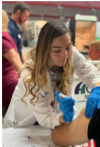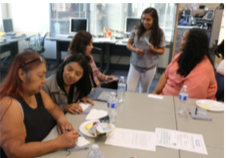News Briefs – WINGS Fall 2019
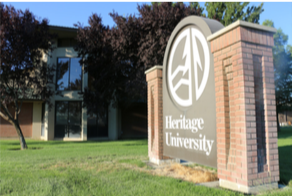 This summer the Northwest Commission of Colleges and Universities (NWCCU) reaffirmed Heritage University’s accreditation. The commission awards accreditation in recognition of educational institutions’ performance, integrity and quality. NWCCU accredited colleges and universities, such as Heritage complete an intensive self-evaluation and peer review every seven years.
This summer the Northwest Commission of Colleges and Universities (NWCCU) reaffirmed Heritage University’s accreditation. The commission awards accreditation in recognition of educational institutions’ performance, integrity and quality. NWCCU accredited colleges and universities, such as Heritage complete an intensive self-evaluation and peer review every seven years.
A team of eight evaluators visited Heritage for five days in April to review the university’s self- evaluation. Following their visit, the team commented on Heritage in five areas:
• The deep commitment of its faculty, staff and administrators to the mission of the university, which guides them in outstanding support of transformative, student- centered education, developing leaders who embrace social justice and community engagement.
• Its dedicated, data-driven efforts to support student access and equity, as exemplified by the summer Math Bridge and English Academy programs that have enabled hundreds of students to advance from developmental to college-level study.
• The Center for Intercultural Learning and Teaching’s (CILT) dedication to the delivery of high quality and continuous faculty development in areas of program review and assessment, the use of classroom technology, cultural responsiveness and care of students, and pedagogy that supports academic excellence for all students.
• The culture of assessment among its professionally accredited undergraduate and graduate-level majors and programs.
• Its Board of Directors for advancing the mission of Heritage University through its strong leadership, engagement, advocacy, philanthropic support and discerning recruitment of new members to the Board.
“It is a reflection of our faculty and staff’s ongoing commitment to achieving the Heritage mission and that we meet the Commission’s expectations for complying with the accreditation criteria,” said Dr. Andrew Sund, Heritage University president. “The accreditation renewal reinforces our conviction in the Heritage mission to empower a multicultural and inclusive student body to overcome the social, cultural, economic and geographic barriers that limit access to higher education embracing a transformational student-centered education that cultivates leadership and a commitment to the promotion of a more just society. We will continue to support the initiatives that made the university what it is and develop new programs that are responsive to the needs of students and the communities we serve.”
EMERGENCY FUND REDUCES DROP OUTS WITH FINANCIAL SAFETY NET
Amarilis Santiago was driving home one night when a drunk driver careened into the side of the car she had borrowed. Thankfully, she was uninjured. But, that one moment almost derailed her education.
“It wasn’t my car and I had the responsibility to pay for the damage and find transportation for myself. I was at the point where I had to decide whether to finish out the school year or dropped out to get a job because I had bills that needed to be paid,” she said.
Fortunately, Heritage had recently launched its Student Emergency Fund, a resource for students like Santiago who are facing temporary and unforeseen financial hardships that can have dire consequences on their college completion. It is one spoke in the university’s HU Cares program, which also includes advocacy and mental health counseling, ride-sharing and even an on-campus food pantry.
“So many of our students’ finances are razor-thin. What seems like a minor bill can be catastrophic for them. A couple hundred dollars shouldn’t be what causes them to drop out of college,” said Melissa Hill, Heritage vice president for student affairs.
Last December, as the Emergency Fund was just being formed, Hill met with the congregation of the Selah Covenant Church to talk about the university and its students. Each year the church’s congregation chooses three causes to support during their holiday fund drive. Each member pledges to contribute 10% of their total holiday giving to the church’s fundraising efforts. That year, they choose Heritage and the Emergency Fund. The group raised $8,353.59 for Heritage students, a third of the total amount contributed overall.
“I’m thankful for the emergency fund,” said Santiago. “Without that support, I would have dropped out.”
Contributions to the Emergency Fund and HU Cares have an immediate impact when the need is at its highest. You can help. Go to heritage.edu/giving to make your gift, or call (509) 865-0700.
SUMMER RESEARCH EXPERIENCE FOR RURAL HIGH SCHOOL STUDENTS
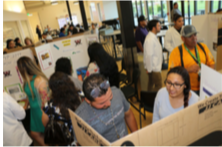 Hispanic and Native American students from the communities surrounding Heritage University spent the summer learning about health sciences during the Summer Program for Yakama Students research experience (SPYS).
Hispanic and Native American students from the communities surrounding Heritage University spent the summer learning about health sciences during the Summer Program for Yakama Students research experience (SPYS).
SPYS is a collaboration between Pacific Northwest University of Health Sciences and Heritage to teach students from the Mt. Adams School District and Yakama Nation Tribal School about health sciences and its career opportunities. The students spend 40 hours a week for seven weeks immersed in science and culture at the two universities. Their experience culminates with a public poster presentation of their individual research, much like their college counterparts do as part of their course of study.
This is the second year Heritage and PNWU have offered the program. In all, 15 students participated in this year’s experience.
HU PROFESSOR AWARDED FELLOWSHIP FOR SOUTH AMERICAN STREAMS STUDIES
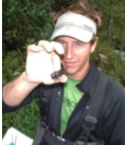 HU Associate Professor Alex Alexiades, Ph.D. received his second Fulbright Fellowship award this summer. He traveled to Colombia to conduct stream biogeochemistry research at the Pedagogical and Technological University of Columbia in Tunja and to train other scientists on his research methodology.
HU Associate Professor Alex Alexiades, Ph.D. received his second Fulbright Fellowship award this summer. He traveled to Colombia to conduct stream biogeochemistry research at the Pedagogical and Technological University of Columbia in Tunja and to train other scientists on his research methodology.
In 2014, Alexiades received his first Fulbright Fellowship to support research in Ecuador. He and his colleagues undertook a collaborative research on flow ecology and the effects of water withdrawals on aquatic fauna in the Napo River Basin.
“These streams have not been well documented and many aspects of their ecology remain poorly understood,” he said.
The results of the Ecuador study was published in the academic journal, Hydrobiologia in July.
ACADEMIC COMMUNITY LOSES GOOD FRIEND AND FORMER HU PROFESSOR
 Former Heritage faculty member Greg Hinze (64) passed away on Saturday, July 13, 2019. Hinze taught history and geography at the university for 8 years, starting in 2008.
Former Heritage faculty member Greg Hinze (64) passed away on Saturday, July 13, 2019. Hinze taught history and geography at the university for 8 years, starting in 2008.
Hinze spent 25 years working as a sign hanger before deciding to go to college. He earned a bachelor’s and a master’s degree from Central Washington University. His master’s thesis on the movement of Arkansas farm workers into the Wenatchee Valley between the 1930s and 1960s was published by the Wenatchee World Press into the book Take Hold. He later researched and wrote a biography of a Yakima Valley orchardist’s family.
Following his years at Heritage, Hinze taught at Yakima Valley Community College and received the student-nominated Faculty of the Year award in 2018.
Greg is survived by his wife of 33 years, Heather (Chittock) Hinze, brother Curtis Hinze, sister Kristi Beers (Gary), son Jason Hinze and grandson Colin Hinze.
MILLIONS IN GRANT FUNDS TO AID HERITAGE SCIENCE STUDENTS
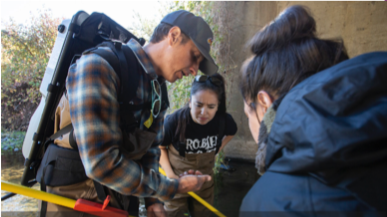
Dr. Alex Alexiades and his students examine fish fry captured through stream shocking collection methods.
A pair of National Science Foundation (NSF) grants totaling $12.5 million, will help Heritage and its partnering institutions increase the number of low-income and minority students preparing to enter careers in the science, technology, engineering and mathematics (STEM) fields.
In July, the university announced that it was awarded $2.5 million from the NSF Improving Undergraduate STEM Education: Hispanic Serving Institutions Program. The funds will be used
to support the university’s Cultural Responsive Education in STEM (CRESCENT) initiative. CRESCENT aims to increase the number of Hispanics and Native Americans in the STEM workforce by bolstering student supports and hands-on research opportunities, as well as faculty professional development and institutional partnerships.
“We have many talented and driven students in our region who are interested in pursuing STEM careers but can sometimes struggle on their journeys and become discouraged. The CRESCENT program is designed to support these students throughout their pathway from high school to graduate school,” said Dr. Jessica Black, chair of the sciences programs. “CRESCENT program activities will also empower faculty to develop innovative teaching strategies for instructing our diverse students and prepare the next generation of global citizens with a breadth of knowledge and essential life skills to succeed in the rapidly changing environment of the 21st century.”
The following month, Heritage received word that it and Portland State University (PSU) will share in a $5 million NSF grant to increase the number of low-income, high- achieving students majoring in STEM subjects through the Engagement Achievement and Graduation for Low- incomE Students (EAGLES) program. Through the program, the grant will provide scholarships to students in STEM studies at either Heritage or PSU whose career goals include working to address environmental pollution, as well as mentoring and research opportunities. Students at both universities will also participate in shared research experiences, coursework and cross-campus networking. In addition, pre- engineering students at Heritage who wish to pursue bachelor’s degrees in civil and environmental engineering at PSU will have access to that university’s career placement services and graduate programs for more a seamless transferring process.
“The research and service- learning activities conducted by our students will address authentic local and regional issues and strengthen community connections, and these results will demonstrate a model worthy of national replication for increasing enrollment, retention, and graduation in STEM majors and development of the sense of science identity needed in further studies and/or careers in the environmental sciences and engineering,” said Dr. Alexander Alexiades, associate professor and the principal investigator for the grant at Heritage.
Both the EAGLES and the CRESCENT programs are funded through 2024. In addition to their direct impacts for students, they will each include plans to build culturally responsive learning procedures aimed at developing undergraduate students’ science identity and their sense of community as a mechanism to increase academic outcomes and expand success beyond the bounds of the grants.
STUDENTS DO THEIR PART TO PROTECT AGAINST THE FLU
Visitors to the Central Washington State Fair could get a side of the flu shot to go along with their corn dogs and fried candy bars. Heritage nursing and physician assistant students were part of a team of volunteers administering flu shots for Howard’s Drug of Selah and the Yakima Health District to fairgoers of all ages. All totaled, 1,400 flu shots were given.
ENACTUS STUDENTS HELP OTHERS RISE UP
Heritage University Enactus members and alumni started a new project to empower women in the Yakima Valley. Women Rise Up, is a
three-year initiative being conducted in partnership with the Yakima Housing Authority that aims to teach participants financial literacy skills. After they complete the project, participants have the opportunity to receive financial help towards home ownership.
During the first event at the WorkSource office in Union Gap, Washington, Heritage faculty member Vicky Swank introduced budgeting practices to the participants. Each of the women received a 12-month calendar and a budget planner to help them get started. Enactus members and alumni are serving as mentors to the women during the span of the project.
STILL TIME FOR 2019 IRA CHARITABLE ROLLOVER
Believe it or not, some savvy individuals are already considering how to make smart decisions when supporting their favorite nonprofits before the end of the year. One opportunity that has grown in popularity is making a donation through an IRA. Often called an IRA Charitable Rollover, there are many benefits of this type of contribution.
A qualified charitable distribution (QCD) is a direct transfer from an IRA to a charity. This giving strategy is available to individuals who are 70 1⁄2 and older which is the same group that is subject to required annual minimum distributions (RMD) from their IRA. When a transfer is made from the plan’s administrator directly to the charity, the transfer satisfies the RMD and it is also excluded from the individuals’ income which decreases their adjusted gross income.
While this giving strategy is a clever way to optimize your 2019 donations, it also benefits a nonprofit such as Heritage University by helping to further the work and mission of our organization. Visit heritage.edu/howtoinvest for more information.


